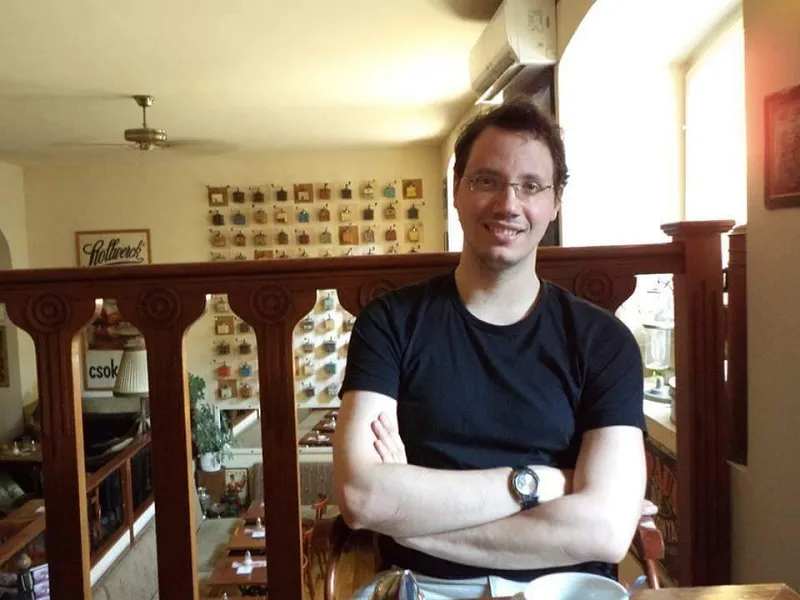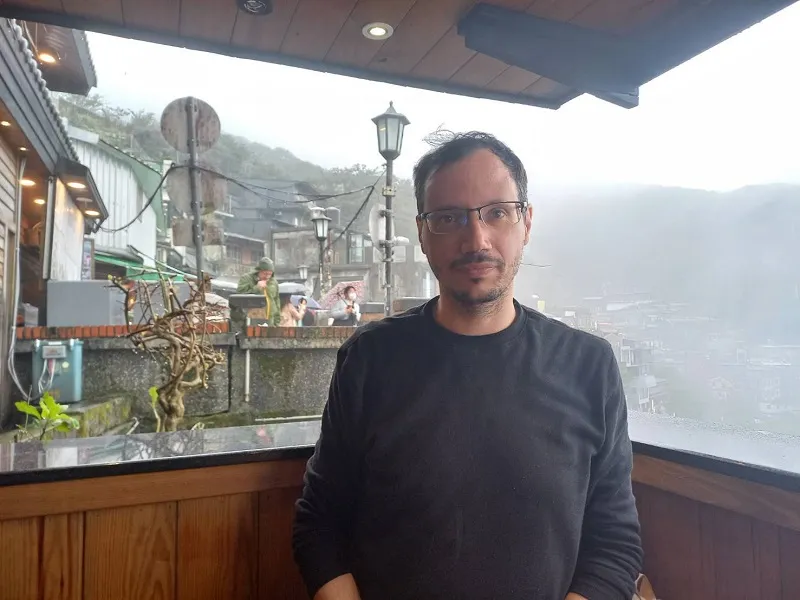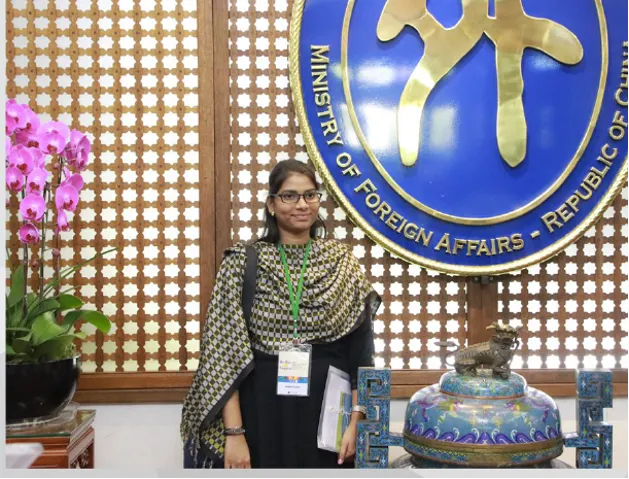By Maria Wilkinson
Are you thinking about getting your Ph.D. in Taiwan? National Chengchi University (NCCU) offers a number of Ph.D. programs. International Doctoral Program in Asia-Pacific Studies (IDAS) is an all-English taught program. The IDAS program allows students from around the world to gain a comprehensive understanding of the Asia-Pacific region from a country with a unique perspective in the region.
The following introductions are from three current students in the IDAS program. Each has amazing backstories that have brought them to this program. Each story is special, but it is not unusual that exceptional people find themselves at IDAS. Who knows, you may also be one of these unique stories one day.
Meet András János Teleki
András’ background did not start with international affairs or a focus on the Asian region. He grew up in Hungary and instead of joining a bachelor program after high school, he took on a five-year master’s program to learn History and Art History at Pázmány Péter Catholic University. During his master’s program, András went to Ireland to improve his English ability and to volunteer at International Volunteer Glencree Centre for Peace and Reconciliation of Northern Irish Conflict.
András went back to Hungary and graduated. After graduation, he started to work for a Hungarian thinktank, as an International Press Observer, Press Analyst, and Editor. A lot of András work at the institute required him to gather and analyze British and US news for government and corporate clients.
At the same time, András was studying as a Ph.D. student in Cultural History Studies at Eötvös Loránd University. It wasn’t until three years ago that András’ interest shifted to Asia. He began to look for options to learn in Asia.
The first time that András came to Taiwan it was under then Huayu scholarship to study Chinese at a language center in the south. After his time as a language student, András wanted to test his English ability, so he attended a master’s program, Mainland Studies, which he learned at Chinese Culture University under the Ministry of Education (MOE) scholarship. After proving to himself that he would be able to attend an all-English taught program, András applied to IDAS.
András was attracted to the holistic approach to the program. Classes are diverse as topics range from politics to culture to economics. Classes that he has found to be most enriching to András are the IDAS introduction classes such as Development in East Asia. In addition, András has also found the Chinese program at NCCU to be well put together as there are classes for every level.
Currently, András is tackling all ten courses in his first year to get a jump start on his thesis. In the upcoming year he will narrow down his research focus to prepare his research topic. He is juggling between research on populism and European autocracy, countries changing their allegiance from Taiwan to China, or the cultural policy of the Chinese Confucius institutes.
From history to, now, Asian studies, András has found IDAS to be the perfect place for him to expand his academic knowledge.


▲Photo credit to András János Teleki
Meet Marvin Hamor Bernardo
Marvin is a first-year, second-semester student in IDAS. Originally from the Philippines, Marvin grew up closely observing local politics in the Philippines. When you ask Marvin to describe his research interests, he will tell you he does “Guns, Bombs, and Rainbows”.

▲ Logo of Marvin’s Slogan “Guns, Bombs, and Rainbows”
/ Photo credit to Marvin Hamor Bernardo
Marvin studied Art History, more specifically Chinese art, at Reed College in Portland, Oregon. During his undergraduate degree, Marvin attended Capital Normal University (首都師範大學), Beijing as a language exchange student. While attending language courses, Marvin had the chance to expand on his passion for Chinese art.
After Marvin’s undergraduate studies, Marvin returned home and had the overwhelming sense that he wanted to shift his work focus to Philippine politics after his exposure to local politics when young. It was at the University of the Philippines that Marvin received his master’s in International Studies. His master’s thesis was titled Judicialization of Social Policy: A Comparative Study of Marriage Equality Legalization in Singapore and Taiwan.
His master’s thesis and work experience is where the branded “Guns, Bombs, and Rainbows” emerged. Marvin first came to Taiwan to conduct fieldwork on LGBTQIA+ rights, an interest sparked after the 2017 Constitutional Court Ruling on same-sex marriage. This is where Marvin’s “rainbow” came from. In addition, through courses and work interaction with strategic studies, a further passion for geopolitics resulted in the “guns and bombs” of his slogan.
After finishing his master’s, Marvin chose to return to Taiwan for his Ph.D. Marvin says that Taiwan is an open society for studying what you want to study. In a time where conservativism is trending in Asia, Taiwan is “kind of an island refuge in a sea of conservativism.”
After finishing his Ph.D., Marvin plans to return to the Philippines to become a professor. IDAS is an anchor point for Marvin to build his research relationship with Taiwan. One research interest for his Ph.D. concerns looking at how LGBTQIA+ rights can be a possibility for Taiwan to expand its diplomatic sphere.
As Marvin explains, when looking at the relationship between Taiwan and China, it always comes from a point of military and government. But Marvin argues there are spaces where Taiwan can fit that China isn’t fitting in the international sphere, which is LGBTQIA+ rights. What is important to understand and what Marvin seeks to explain is how Taiwan could gain influence where China can’t. As a place of research relevance for Marvin’s future job goals, IDAS fits swimmingly into his passions.


▲Photo credit to Marvin Hamor Bernardo
Meet Aswini Kumar
Aswini grew up in southern India and her interest in international relations came from her love of Korean drama. Aswini describes her love for East Asian dramas to be somewhat different from the norm, as many of her peers in India tended to gravitate toward Bollywood dramas.
At first, Aswini studied science and received a bachelor's in physics at Stella Maris College for women. Then from science to social science, Aswini received a Master’s of Arts in International Relations and a Master’s of Philosophy in International Relations from the University of Madras.
Now, as Aswini is in her fourth year, second semester at IDAS, Aswini has recently been recognized as an Outstanding Graduate Student of 2023 by the Ministry of Education. During her time as an IDAS student, Aswini worked at Academica Sinca as a Research Assistant at the Institute of Political Science.
Aswini came to Taiwan due to her work experience after her master’s. After graduation, Aswini worked at Chennai Centre for China Studies as a Research Officer. Her focus was on China’s soft-power policy toward India. After that, she worked at the Taipei Economic and Cultural Center in Chennai, India as an Intern-cum-Assistant to Director-General and then as an Administrative Officer and Secretary to the Director-General.
From her work at the Taipei Economic and Cultural Center in Chennai, Aswini became increasingly aware of the accommodating policies India had for Taiwan. This suggested to Aswini that Taiwan was becoming more important to India, especially in the tech sector.
During her Ph.D, Aswini worked for the Taiwan Center for Security Studies at NCCU. Due to her background in science and because the US-China tech war was a big topic at the time of her work, Aswini’s research at the institute became focused on semiconductors. From there, Aswini’s research has since focused on Taiwan-India’s tech relationship.
As India and Taiwan’s relationship grows, Aswini understands that India will need experts that have a firm grasp of Taiwan and can provide knowledgeable risk assessment information. Aswini knows that her time at IDAS will give her a competitive edge to fill this need.
Aswini has been grateful for the wealth of knowledge that IDAS professors have. Studying at NCCU has helped connect Aswini to a number of opportunities that may not have been possible elsewhere. During her time at IDAS, Aswini has a chance to continue her love for anima and K-drama while expanding her academic knowledge of international affairs.

Indian Delegate at the Inaugural of the 2018 Taiwan Study Camp
For Future Leaders From Asia-Pacific Region at the MOFA premises
▲Photo credit to Aswini Kumar
Important Notes about the IDAS Program
IDAS students are required to complete 30 credits. Three credits tend to make up one course, which equals roughly 10 classes in total. Once students finish their 30 credits, they are eligible to take the qualification exam. Successful completion of this exam is what turns Ph.D. students into Ph.D. candidates. The exam is held once a year in May. Once IDAS students pass this test, then they are eligible to begin their Ph.D. thesis process. A typical Ph.D. program in Taiwan lasts four years, IDAS is no exception.